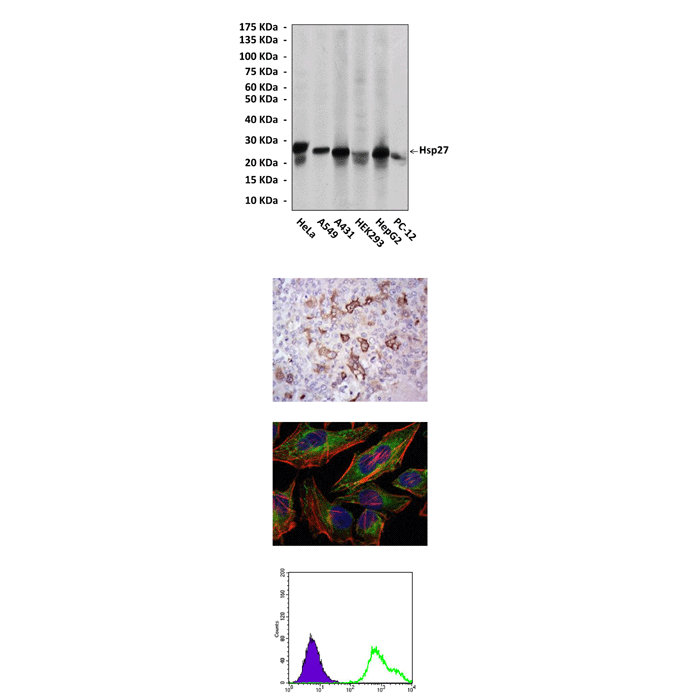Product Sheet CP10391
Description
BACKGROUND Heat-shock protein 27, Hsp27, (also known as Hsp25 in the mouse), a member of the small-Hsp family, is found in human cells- both cancer cells and normal cells. In addition to its role in protein folding, Hsp27 intervenes in the modulation of differentiation as well as in apoptosis. Furthermore, it has been identified as a potent regulator of the cytoskeleton as a result of its ability to inhibit actin polymerization.1 This property is dependent on the phosphorylation state of Hsp27 and its structural organization. Hsp27 can be reversibly phosphorylated on three serine residues in humans (two for Hsp25 in mice) by the mitogen-activated protein kinase-activated kinases 2 and 3 (MK2/3), which are themselves activated by phosphorylation through either the p38 or the extracellular signal-regulated protein kinase (ERK) signaling pathway. Upstream signals, such as differentiating agents and mitogens, that activate MK2/3 also have the ability to induce Hsp27 phosphorylation. In general, it is believed that MK2/3 are the main mediators of Hsp27 phosphorylation, but other kinases such as PKC delta can also phosphorylate Hsp27.2 This protein, besides its putative role in thermotolerance, is of special clinical interest because of recent data suggesting it may also play a role in drug resistance.3 In patients with cervical cancer, Hsp27 is predominantly expressed in well-differentiated and moderately differentiated squamous cell carcinomas. In addition, expression of Hsp27 seems to be a negative prognostic factor for gastric cancer. Different isoforms of Hsp27 have been found in lymphoid tissue of patients with acute lympho-blastic leukemia, and the protein has also been associated with viral infections.
REFERENCES
1. Ciocca DR et al.: J. Natl Can. Inst., 85: 1558-1570, 1993.
2. Landry J et al.: J. Biol. Chem. 267: 794-803, 1992.
3. Ciocca DR & Calderwood SK: Cell Stress Chaperones, 10:86-103, 2005.
2. Landry J et al.: J. Biol. Chem. 267: 794-803, 1992.
3. Ciocca DR & Calderwood SK: Cell Stress Chaperones, 10:86-103, 2005.
Products are for research use only. They are not intended for human, animal, or diagnostic applications.

(Click to Enlarge) Top: Western blot detection of Hsp27 proteins in various cell lysates using Hsp27 Antibody. Middle Upper: This antibody stains paraffin-embedded human breast cancer tissue in IHC analysis. Middle Lower: It also stains HeLa cells in confocal immunofluorescent testing (Hsp27 antibody: Green; Actin filaments: Red; DRAQ5 DNA Dye: Blue). Bottom: This antibody detects Hsp27 proteins specifically in HepG2 cells by FACS assay (Hsp27 antibody: Green; negative control: Purple).
Details
Cat.No.: | CP10391 |
Antigen: | Raised against recombinant human Hsp27 fragments expressed in E. coli. |
Isotype: | Mouse IgG1 |
Species & predicted species cross- reactivity ( ): | Human |
Applications & Suggested starting dilutions:* | WB 1:1000 IP n/d IHC 1:50 - 1:200 ICC 1:50 - 1:200 FACS 1:50 - 1:200 |
Predicted Molecular Weight of protein: | 27 kDa |
Specificity/Sensitivity: | Detects Hsp27 proteins in various cell lysate. |
Storage: | Store at -20°C, 4°C for frequent use. Avoid repeated freeze-thaw cycles. |
*Optimal working dilutions must be determined by end user.
Products
| Product | Size | CAT.# | Price | Quantity |
|---|---|---|---|---|
| Mouse Hsp27 Antibody: Mouse Hsp27 Antibody | Size: 100 ul | CAT.#: CP10391 | Price: $457.00 |
